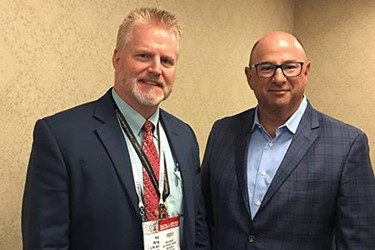Clay Siegall Reveals What Surprised Him Most From Founding Seattle Genetics

By Rob Wright, Chief Editor, Life Science Leader
Follow Me On Twitter @RfwrightLSL

The March 2018 issue of Life Science Leader features Clay Siegall, founder, president, CEO, and chairman of Seattle Genetics. Siegall was interviewed in San Francisco during the 36th Annual J.P. Morgan Healthcare Conference (JPM). One of the challenges of producing a print publication is there isn’t always space to share all of the great insights from an executive like Siegall. That’s one of the reasons we created our exclusive, Beyond The Printed Page section on our website. And while access to this continues to be free, to read the comprehensive feature involving Seattle Genetics you need to be a subscriber — which you can do here. We hope you enjoy this latest Beyond The Printed Page installment.
The first two FDA oncologic drug advisory committee (ODAC) meetings for Seattle Genetics’ product ADCETRIS were for two indications and were four-hours long — each, followed by the vote. “When you see a 10-0 vote, twice, I imagine it’s like what an athlete feels when they win the Super Bowl or something,” says Clay Siegall, president, CEO, and chairman of the board. “You feel very proud of what you and your team did.” Other than making drugs, he says his ODAC experience is probably one of the most interesting things a founding CEO can undergo. But there is something else he finds extremely gratifying, which came as a bit of a surprise. “When I founded the company I didn’t know how much I’d come to enjoy the experience of hiring smart people, lots of them, and helping them to build their careers,” he attests. “When you get a Ph.D., you think: ‘Am I going to be an academic scientist? Am I going to work at a university? Am I going to be a professor?’ Those are the things that cross your mind, because that’s what you know.”
Like many scientists who complete a Ph.D., Siegall did a postdoctoral fellowship. “I was at the NIH’s National Cancer Institute (NCI), which is still very academic,” he admits. “It’s not a university, but it’s not a company. And your goal is to learn, publish, and explore the universe of how cancer works and how to stop it.” Siegall shares that, although a wonderful experience, it was very different from working in industry. “When I was there, I never thought that this was what I want to do,” he states. “But I’ve always wanted to make cancer drugs, and for most of my professional career that’s what I’ve done.” Making drugs that make a difference in the lives of cancer patients is something Siegall says still excites him — each and every day. “But building a company that is helping to build the careers of so many people is something I never expected to be equally rewarding,” he concludes.
